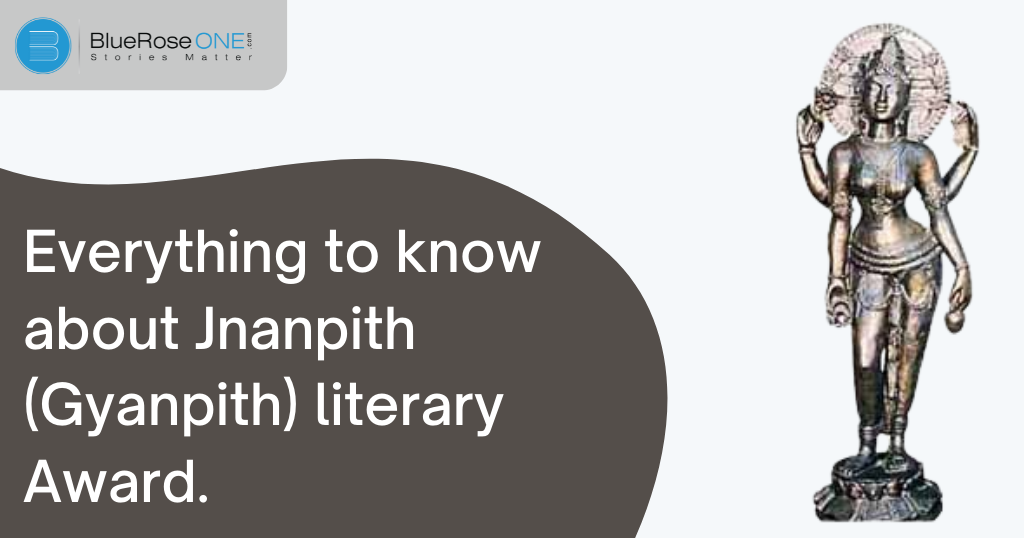The Bharatiya Jnanpith award (Gyanpith award) annually presents an author with the Jnanpith Award, the highest and oldest literary honour in India, in recognition of their “great contribution to literature.” The Jnanpith award, which was established in 1961, is exclusively given to Indian authors who write in English and one of the Indian languages listed in the Eighth Schedule to the Constitution of India. Posthumous recipients are not eligible.
Complete history behind Jnanpith (Gyanpith) Award
The idea to launch a program “commanding national prestige and of international standard” to “select the best book out of the publications in Indian languages” originated in May 1961 at the Bharatiya Jnanpith, a research and cultural institution founded in 1944 by industrialist Sahu Shanti Prasad Jain of the Sahu Jain family.
A few literary specialists were invited by Rama Jain, the founder of the Bharatiya Dnyanpith, later in November to discuss various components of the plan. Rajendra Prasad, the then-President of India, who had expressed interest in the implementation of the system, was given the first draft. The concept was also brought up during the 1962 annual meetings of the Bharatiya Bhasha Parishad and the All India Gujarati Sahitya Parishad.
For the first award, works that were released between 1921 and 1951 were taken into consideration. The board would receive nominations from the nine established language committees along with translations of the work into Hindi or English. Four authors participated in the final round: Viswanatha Satyanarayana (Telugu), D. V. Gundappa (Kannada), Kazi Nazrul Islam (Bengali), and G. Sankara Kurup (Malayalam).
At a ceremony conducted at Vigyan Bhavan in Delhi on November 19, 1966, Kurup received the citation, a statue of Saraswati, and a check for one lakh rupees (equal to 51 lakh rupees or $64,000 in 2020). Kurup praised the new award’s idea and complimented it for fostering “integration of the varied people of this nation on a spiritual level” in his acceptance speech.
How to get nominated for Jnanpith (Gyanpith) Awards.
Universities, numerous literary and linguistic organisations, instructors, reviewers, and other literary specialists all submit nominations for the award. For each of the languages, an advisory council is established every three years. For the next two years, the language of the most recent recipient’s work is ineligible for consideration. Three literary critics and linguists from each committee represent their respective languages. The committee reviews each nominee, and it then makes recommendations to the Jnanpith Award Selection Board (Pravara Parishad).
Read: List of top 10 book clubs in Pune that everyone should join
The Selection Board is made up of seven to eleven “high repute and integrity” individuals. Each member of the committee serves a three-year term that may be renewed for two more periods. The board evaluates the proposals of all language advisory committees based on full or incomplete translations of the chosen literature of the suggested authors into Hindi or English. The Selection Board, which has ultimate discretion in selection, makes the announcement of the recipient for a specific year.
Jnanpith Award Winner 2022
Damodar Mauzo is a Goan author, short story writer, critic, and Konkani screenplay writer. For his book Karmelin, he received the Sahitya Akademi Award in 1983. For his book Tsunami Simon, he received the Vimala V. Pai Vishwa Konkani Sahitya Puraskar in 2011.
Jnanpith Award is one of the most prestigious and oldest literary award in India. It’s aim is to recognise literary talents across several languages in India. A monetary award, a certificate, and a bronze statue of Vagdevi (Saraswati), the goddess of learning, come with the honour. The cultural institution Bharatiya Jnanpith is funding it.
BlueRose Publishers have an award called BlueRose Awards for the authors who publish with us. Regardless of their genre, language, or geographic location, the prize aspires to recognise significant literary luminaries in the world of literature. The goal of the BlueRose Book Awards is to honour authors who have consistently worked to improve society.
The goal of BlueRoseONE is to bring together under one roof the many true stories of well-known and up-and-coming authors. This area will provide readers and writers with a platform to explain and investigate the various shades of an author’s journey.

















